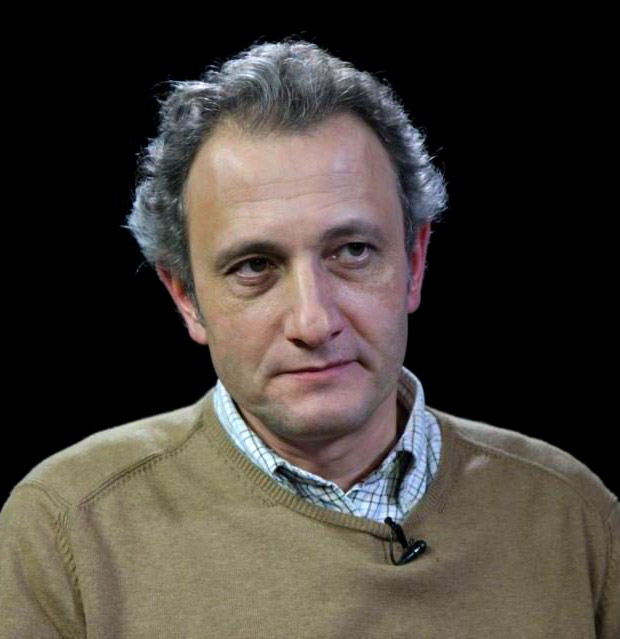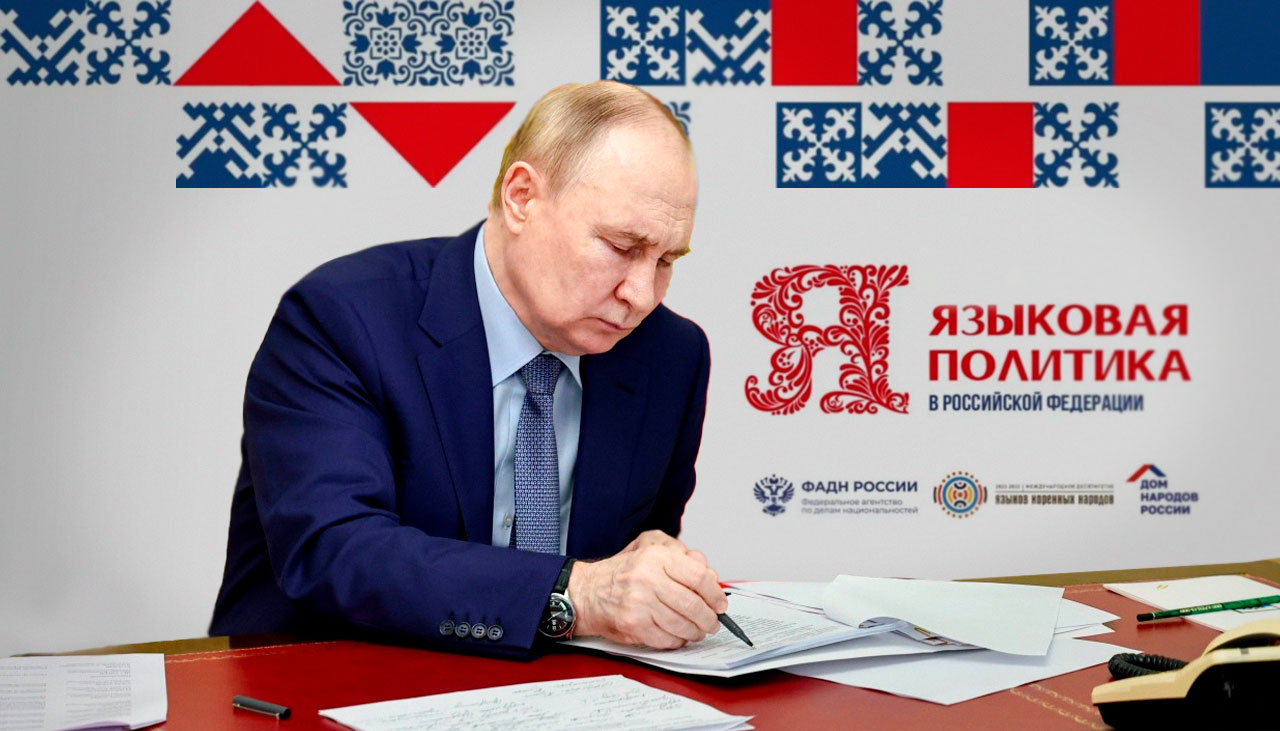... and without bones the tongue, to clear sounds fond,
thanks fate with a Cyrillic sign.
Joseph Brodsky, «Fifth Anniversary», 1977
 Putin approved the Fundamentals of Language Policy by his decree. Previously, there was a language without authorities and without bones, now it will also be driven into the framework of something «unified». Previously, the policy was «baseless», now it is based on «traditional Russian spiritual and moral values».
Putin approved the Fundamentals of Language Policy by his decree. Previously, there was a language without authorities and without bones, now it will also be driven into the framework of something «unified». Previously, the policy was «baseless», now it is based on «traditional Russian spiritual and moral values».
That is, when a citizen of Russia hears from a person in power: «Stand still, b...!», they receive a charge of these values. Or, when State Duma deputies call people recognized as foreign agents «traitors» in their Telegram channels, which is not even based on their repressive law — this is also «all the r and l of the holy language», as the poet said. Their language, they monopolized it, they do with it whatever they want.
Their social dialect, which they consider the Russian language, has three registers. The register of pathos. The register of hatred. The register of official bureaucratic language.
If you consider the speech of a government representative, most often all these three registers — praise of the leader and his policies, vilification of an imaginary enemy, and the use of clumsy multi-tiered constructions — are combined.
At the «base» of the Fundamentals, as one might guess, lies the official language. It is highly mixed with pathos and weakly kicks various enemies creating threats to the «great and mighty».
The Fundamentals remind that Russian — according to the ideological amendments to the 2020 Constitution, is the language of the «state-forming people». This phrase alone would horrify the classics and true specialists. This is not for Dal, Ushakov, Ozhegov, Rozental. There is no such word in the Russian language.
The authors of documents with ideological and propaganda significance (the Fundamentals have no other) have an obsession with the word «millennial». «A millennial experience of independent statehood» developed this language. And if it were 800 years. Or 200? The existence of the modern Russian language is usually counted from Pushkin. And before that, as Kostik noted in Leonid Zorin's «Pokrovsky Gates», there was «some Kheraskov». What can be said about historical roots, comparative linguistics of Slavic languages — with millennial roots, everything will be complicated. For example, the Czech language is very archaic and closer to the «roots» than Russian. It is interesting to study the linguistic evolution of letters, sounds, words, expressions by comparing Polish and Russian languages. In philology departments, everyone knows this, they were taught this, at least years and decades ago. Knowledge greatly undermines the imperial pathos, according to which all other Slavic languages are merely underdeveloped dialects of Russian, at least the nearby ones — certainly. But whose dialect is whose is still a big question. One can only advise the Kremlin administration to write an article for Putin, like for Stalin — «On the Issues of Linguistics». And put an end to discrepancies: the Russian language is the most correct of all Slavic languages. Therefore, it is «state-forming». I wonder if this word can be translated even into Serbo-Croatian?

The Russian language as the language of the empire creates an «unified cultural-civilizational community». This is its unique property. But as soon as you start getting acquainted with the texts, for example, of European far-right, you realize that they are all unique and their armored train is also on a special track. And if the word «civilization» or «civilizational» is on a campaign poster, the candidate is definitely from an ultra-conservative party.
And again: the Russian language is «inextricably linked with traditional Russian spiritual and moral values». Especially, probably, profanity... And the language of Stalinist newspapers. And the language of Kremlin TV talk shows. And the language of the newspaper «Tomorrow» — who came from the soil. Or didn't even leave it...
The task of language policy (it's not about beef tongue with horseradish) — «increasing the significance of Russia in the global humanitarian space». This «significance» was there. Both in Soviet times and post-Soviet. Russian classical literature. Some quality Soviet literature. The incredible popularity of the Russian language during the years of perestroika and reforms. And now it's gone. And it won't be back for a long time. Because instead of the language of diplomacy and dialogue, the language of missiles and drones is used. This is now what the Russian language is associated with in the world. It is debased. Profaned. Betrayed. Somehow Pushkin is now responsible for Putin.
SVO has caused colossal damage to the spread of the Russian language, interest in it, in Russian literature. Russian as a foreign language — a collapsed industry that was fantastically popular during Gorbachev's perestroika and Yeltsin's reforms.
The language was part of soft power. And now it is gone.
But the authors of the Fundamentals talk about risks. Just not about those that actually exist. For example, for regulating language policy, there is a lack of a federal body. For the policy of beef tongue with horseradish, there is a body, but for just language — there is not. Of course, in the logic of the Putin regime, the state and bureaucracy decide everything. No bureaucratic structure — no problem solved.
There is concern about the widespread non-compliance with linguistic norms — and you more often release deputies into the media space, use the language of hatred even more actively than Solovyov, and there will be no norms in the language at all. Foreign words appear, including those not in the dictionary of foreign words — what a confusion... They haven't even heard the slang of modern teenagers...
Signs in Russian will save the nation. It's better to ban the Latin alphabet altogether and then, like in the 16th century, the alien «Latinism» will disappear. Thus ensuring «national security in the linguistic sphere». Let's go from Cyrillic to Glagolitic, to the very roots. From it — to Greek, and from there to Phoenician script. Then «civilization» from «millennial» will turn into «multi-millennial».
Risk — this is the language of hatred of Skabeeva and Solovyov. Risk — this is the shout of a guard. This is the order: «Hands on your head!» This is the slang of officials. This is the official and simultaneously rubbery language of repressive laws.
«High social value of linguistic culture». What kind of linguistic culture can there be for a language of hatred and repression, which is adopted by the entire Russian political class?
The Russian language, as stated in the Fundamentals, promotes interest in books, in literary creativity. All these benevolent words are composed under conditions of direct political attack on the book market and severe censorship.
«Assistance to foreign scientific institutions», which are still inclined to study the Russian language? They are all now under the surveillance of special services.
«Linguistic adaptation of foreign citizens». Well, we know this. This is about migrants. Who should be driven out with a filthy broom from here, and children should be forbidden to study in schools. So that they do not accidentally learn the Russian language, do not become citizens of Russia, do not contribute legally to economic growth.
Teaching the Russian language? But even the tasks for OGE and EGE are becoming politicized and militarized. The Russian language was, once, not at all about this.
The authorities take away the main thing from society — civil rights, history. And now also the language, otherwise the state is not totalitarian enough. However, the experience of the existence of the Russian language, including in exile abroad and underground within the country, and even in the legal Soviet version, shows that it cannot be taken away, unified for ideological purposes, destroyed. Its reputation can be seriously damaged, but it should be assumed that it is recoverable. Like the reputation of German, Spanish, Italian.
They have their dialect. The language is ours. People speak it, not functions and not the crowd.
Arseny Alexandrovich Tarkovsky explained:
«...Flows through the veins — my pain and blessing —
The icy moisture of underground springs,
All the r and l of the holy language...»
* Andrey Kolesnikov is considered a «foreign agent» by the Ministry of Justice of the Russian Federation.
Photo: kremlin.ru